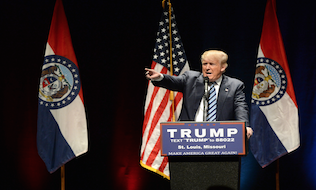

After months, and even years, of buildup and anticipating, Republican nominee Donald Trump is the next president of the United States. Looking at his platform, and any policy changes or enhancements proposed on the campaign trail, what does a Republican presidency mean for U.S. employers and the benefits they offer to employees?
Health insurance
During the election campaign, Trump promised he’d repeal the Affordable Care Act, also known as Obamacare, within the first 100 days. But Mike Aitken, vice-president of government affairs at the Society for Human Resource Management in Washington, says that would be a challenge.
“There are also concerns when you do that, because employers have modified many of their health-care coverage requirements to comply with the Affordable Care Act. Administratively, putting the toothpaste back in the tube is going to be very difficult to do.”
Read: Changing trends in U.S. health-care benefits
Kenneth Laverriere, a partner at Shearman & Sterling LLP in New York, agrees that repealing the Affordable Care Act could have a dramatic impact on employers. “The idea of reverting back to any type of system in the U.S. . . . where health insurance was offered largely through employers is just a mistake that’s not worth repeating,” he says.
“We need a system that allows for mobility, that’s not tied to staying with a particular company. Removing health care from something that has to be provided by employers would open up tremendous opportunities for mobility.”
Trump is suggesting replacing the Affordable Care Act with health savings accounts. “Account-based programs, generally, is something the Republicans love,” says Tami Simon, a global practice leader at Xerox HR Services in Washington.
“You’re going to see a lot more support in this area,” she adds.
A major concern from employers, regardless of who’s in the White House, is a new 40 per cent excise tax that’s going to affect employer-sponsored health plans beginning in 2020, says Melissa Murdock, senior manager of public policy and external affairs at WorldatWork in Washington. “There will be a big push in the new Congress to see if we can get this portion of the Affordable Care Act repealed.”
Paid leave
Paid leave regulations have also been a hot topic on the campaign trail. Trump intends to rewrite the tax code to allow working parents to deduct childcare expenses from their income taxes for up to four children and elderly dependants. He also plans to allow parents to enrol in tax-free savings accounts to care for their children or elderly relatives, encourage employers to provide childcare in the workplace and provide six weeks of paid leave to new mothers before returning to work.
“This is the first time we’ve had a Republican candidate talking about maternity leave at the federal level,” says Murdock. “We do expect for this to be an issue that will continue to get a lot of attention and there might be an opportunity for something to pass.”
Read: Paid sick leave to be extended to 800,000 U.S. employees
The big win on that issue is that it has gotten people talking about it, according to Laverriere. “It’s a meaningful way to start a dialogue with Congress around a national set of rules that make it easier for people to have families, support them, take time off to raise children or care for dependants, as opposed to the family medical leave provision in the U.S., which is essentially unpaid leave but you can use your vacation if you have it.”
Tax reform and taxable benefits
Along the campaign trail, both nominees have talked about tax reform, which could affect employer-sponsored benefits such as health care, pension plans, transit benefits and educational assistance, says Aitken.
“The reason being, when you look at the federal treasury and what’s called a tax expenditure, employers don’t have to pay tax on the value of [these] benefits they provide to employees, neither do employees themselves. In the context of tax reform, there would be a re-examine of whether or not those provisions should remain tax free.”
Read: Americans won’t meet economic needs in retirement
Simon says tax reform is the No. 1 issue the industry is watching. “We don’t really know where this is going to go, whether this conversation is going to lead to retirement contributions or retirement caps, whether it’s going to lead to the taxation of employer or employee contributions or caps to health-care benefits,” she says.
“One thing that’s sure . . . this is the first time where I think that tax reform is very seriously going to talk about the taxation of benefits, both on the retirement and health-care side. I don’t think it’s an if anymore. I think it’s a how. And that’s huge.”
